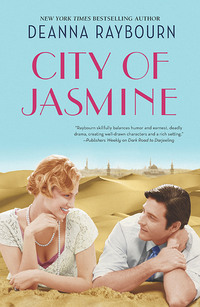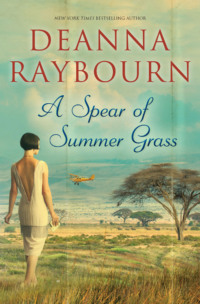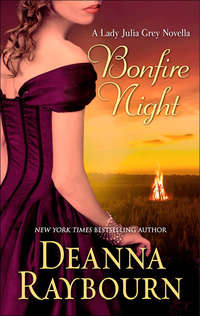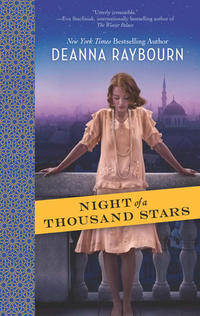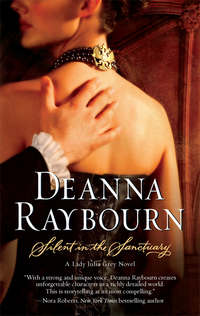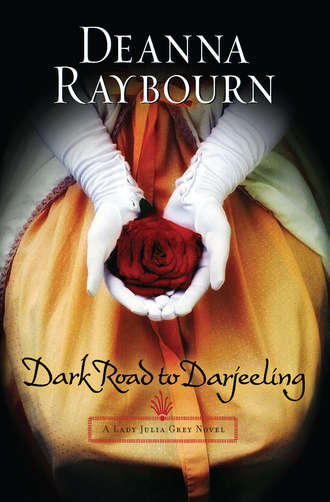
Полная версия
Dark Road to Darjeeling
“Perhaps Miss Thorne will smooth the way for her. Becoming a grown woman of accomplishment is a difficult task.”
“And Cassandra is rather too occupied to put her hand to it. She is an artist you know,” he said, casting a proud glance at his wife. She had just emerged from the house, Percival once more securely tucked into her braids. She strode dramatically through the garden, breaking off a large, luscious blossom to tuck into her décolletage.
“I cannot think Miss Cavendish will like that,” the Reverend murmured, a twinkle in his eye.
I smiled at him. “I think it is time for some refreshment, Reverend.”
The next half hour or so passed pleasantly enough. As expected, Miss Cavendish made a sharp remark about the blossom nesting in Cassandra’s neckline, but the lady simply waved an airy hand, scattering crumbs from a plum tart as she did so. I imagined not much troubled Cassandra, for she wore the imperturbable expression of an artist to whom material needs are never a concern. I had seen it before upon Plum, but to my surprise, he made no attempt to speak to his kindred spirit. His attentions were fully occupied by the lovely Miss Thorne. The more I watched them, the more interested I became, for she seemed entirely unmoved by his conversation, an unusual thing for Plum. He was, by virtue both of excellent birth and considerable personal attractions, quite accustomed to reciprocal attentions from any lady toward whom he cast his eye—with the obvious and painful exception of our sister-in-law, Violante. Being met with demure detachment would only whet his appetites, I suspected, and it certainly fired the interest of another, for more than once I detected the surreptitious stare of Miss Cavendish directed toward the pair. Before I could reflect further upon the matter, I saw Jane rise, give a little cry and put her hands to her belly, then fall backward into her chair again.
In an instant, Plum was supporting her with the aid of Harry Cavendish, while the Reverend hovered, looking worried. Miss Thorne hastened to shepherd the children aside and Portia, her brow white with fear, took Jane’s hands.
“I am sorry,” Jane said, giving a shaky smile. “I felt suddenly unwell. I am better now,” she said, but her face held no colour and her hands trembled in Portia’s. She gave a quick gasp and took hold of her belly again.
Portia looked around wildly, speaking to no one in particular. “She has another month yet. It is too soon.”
Miss Cavendish stepped forward. “Gentlemen, if you will convey Mrs. Cavendish to her room, we will attend her.”
It was a sign of Jane’s discomfort that she did not demur, but allowed herself to be hoisted gently between Plum and Harry, the Reverend following closely behind should they have need of him.
Cassandra had been watching with a sort of curious detachment, and as we left the garden, I heard Miss Thorne’s voice for the first time, low and beautifully-modulated. “I think it best if I take the children home now,” she said firmly, and Cassandra Pennyfeather seemed to recall herself then. “Oh, I suppose so. I may as well come too,” she replied, trailing after her children and lifting a languid hand to me in farewell.
But Cassandra’s peculiarities faded from my mind as soon as I reached Jane’s room. Portia was busy settling Jane comfortably into bed; the others had gathered just outside the door and an argument of sorts seemed to be brewing.
“She must have medical attention,” Plum was saying, infusing his words with all the authority of a thousand years of nobility. He was accustomed to snapping his fingers and having his will obeyed without question, but the Cavendishes exchanged glances with Reverend Pennyfeather, a silent conspiracy of sorts, and it occurred to me that if Jane’s life were to hang in the balance, the Cavendishes could well hasten the end simply by refusing medical treatment for her.
“My brother is right,” I said in ringing tones. I too was accustomed to imposing my will. “Why do you hesitate to send for the doctor? I am told there is one in the vicinity. Do you wish Jane ill that you would even hesitate upon the matter?”
To her credit, Miss Cavendish looked properly horrified. “Of course not! Jane is of the family now. She is one of us, and her child—” She broke off, her eyes fixed upon Harry’s. “Very well. We will send for the doctor.”
“No!” Harry exclaimed, and even the good Reverend shook his head. “Camellia, you dare not.”
Something of Harry’s insistence, or perhaps it was the Reverend’s familiarity, stopped her. Miss Cavendish’s hands clenched and unclenched at her sides, working quickly as she stood between the two factions, my brother and I to one side of her, Harry and the Reverend to the other.
“Why?” I demanded of the Reverend. He darted his eyes to Miss Cavendish and she nodded slowly, as if bestowing permission.
“He is indisposed. He was supposed to come with us today, but when we called for him, we found him unwell. He cannot attend Mrs. Cavendish.”
“He may at least be consulted,” retorted Plum.
“No, he cannot,” Miss Cavendish said, spitting out the words as if they sat bitterly upon her tongue. “He is an inebriate. If he sees her whilst he is under the influence of hard spirits, he might well kill her.”
This time there was no significant exchange of glances, but rather a deliberate failure to look at one another. Harry studied his boot tips while Miss Cavendish stared at her fists and the Reverend shoved his hands roughly through his hair, unsettling his spectacles a little.
“Who else?” I demanded. “Someone must attend to women in their time if the doctor is unreliable. One of the native women if there is no one else.”
If I had expected Miss Cavendish to be outraged by the suggestion that a native woman attend the mistress of the Peacocks, she did not show it. Instead, she nodded slowly.
“It might do. Mary-Benevolence was a midwife for years. She delivered Harry and Freddie both. She only left off when the doctor came to the valley, but I daresay she has not lost the knowledge.”
“You cannot let the cook attend Jane,” remonstrated Harry severely.
To my astonishment, Miss Cavendish turned on him fiercely. “What choice do we have? If the child dies and you did nothing to prevent it, what will people say?”
The colour drained sharply from his face and when he spoke, his voice was a dry whisper. “Of course. I didn’t think. I will fetch her.”
He turned and ran toward the stairs, returning a moment later with a tiny woman who stood no taller than my elbow. She was dressed in typical Hindu fashion, her arms bared, but she wore a rosary at her belt and when she approached us, she crossed herself. Her hair was white as the snows of Kanchenjunga, and I put her at something over sixty years of age. Her arms, though, were sinewy and brown, and her hands supple and strong. Her step was firm and her eyes bright and clear.
“You have need of me, lady?” she asked her mistress, and to my astonishment, her English was spoken with the slightest trace of an Irish brogue.
Miss Cavendish nodded toward the closed door. “Mrs. Cavendish. It is the baby.”
Mary-Benevolence shook her head. “Too soon. You wish that I should look at her?”
“Yes.” Miss Cavendish looked at us all anxiously, then took a deep breath and squared her shoulders, collecting her courage. “Do whatever you must to save Mrs. Cavendish and her child, should they be in danger.”
Mary-Benevolence gave her an inscrutable look. “And if I can save only one?”
“Save them both,” snapped Harry. He turned on his heel and left, but Miss Cavendish nodded toward Mary-Benevolence to second the commission. The little woman disappeared into the room and we were left alone then, the four of us.
“If I may offer a prayer for the health of Mrs. Cavendish and the child,” the Reverend murmured.
Plum and I had little religion, but it suddenly seemed right and good that we should pray for Jane, and I felt a rush of gratitude toward the man as we bowed our heads. When it was done, he took his leave of us, and Miss Cavendish resumed her usual brusque manner.
“I must go to the kitchen. Without Mary-Benevolence to oversee them, the staff will have done precisely nothing toward supper. And there ought to be beef tea for Jane and some hot milk.”
“A moment,” I said, catching her attention. “I am curious about your cook.”
Miss Cavendish gave a little sigh. “My father was devoted to his Irish mother. In her honour, he opened the Buddhist temple on the ridge to an order of nuns from Donegal. The sisters were unsuited to the life here and eventually abandoned the place, but for a while they ran the only school in the valley. Mary-Benevolence was taught to read and write and to speak English there. She also converted to Catholicism, but it was from her mother that she learned the art of midwifery. She delivered all of the babies in the valley until the doctor came.” At the mention of the man, her expression hardened. “And it seems she may have to do so again.”
“Has he always been an inebriate?” I asked.
“No. He has not. He was a lovely gentleman, very quiet, devoted to his wife. Oh, he liked a drink from time to time, but when she died, he seemed unable to gather himself up again.” Miss Cavendish’s eyes were coldly unsympathetic. “He has a duty to the people of this valley, a duty he neglects in order to nurture his own grief. He would find a better remedy for his pain if he applied himself to his responsibilities,” she finished, thrusting her way past me towards the kitchens.
“Cold comfort there,” Plum observed, raising his brows after her.
“Yes, but she does have a point. Pain, grief, loneliness, they are quicksand. They will consume a man if he does not lift a finger to extricate himself.”
“If you struggle in quicksand, you die faster,” Plum corrected.
I waved an impatient hand. “You know what I mean. If a man in peril uses his wits and his natural ingenuity, he may save himself. But a man who gives up has already perished.”
The words cut too near the bone, I think, for Plum fell into a reverie, and we said nothing more of significance as the hours ticked away. From time to time we could hear voices from within Jane’s room, and once a terrible, prolonged sob. But at length Mary-Benevolence appeared, her face drawn but smiling.
“The child lives, and the mother as well,” she told us. I clutched at Plum’s arm in relief, and he squeezed my hand in return.
“Is it born?” he asked.
She shook her head. “No. The pains have stopped and they both rest. She must not rise again until the child is born. Peaceful repose, that is what is required now.”
“Of course,” I told her. “We will do whatever we can to take care of her.”
Mary-Benevolence bowed her head. “I will bring her some refreshment to build her strength, and then she will sleep again. No visitors tonight, I think.”
“I understand,” I told her, suddenly happy that Jane’s care rested in the hands of this tiny, determined woman. “Thank you for all you have done for her.”
She looked at me in surprise. “But it is my duty. She is Mr. Freddie’s wife and she carries his child. She belongs to this house and to this valley now.”
With that, Mary-Benevolence padded away and Plum and I exchanged glances.
“I suppose we can do nothing more tonight,” he said. “I think I will take a tray in my room and go straight to bed. It has been exhausting doing nothing,” he added with a smile. I did not reprove him for his levity. Such relief after so much worry was disorienting, it left one light-headed and peculiar.
Plum hastened to his room while I wandered slowly after, stretching the muscles that had stiffened after hours of sitting in the hall. And as my body stirred to life, so did my mind, and I saw what I ought to have seen hours before: it was entirely possible that Freddie Cavendish had not been murdered at all.
The Fifth Chapter
Henceforth I deal in whispers.
—Untimely Leave
Rabindranath Tagore
I lay awake late into the night, pondering the implications of Freddie Cavendish’s death. If he had been treated by the doctor, perhaps it was simply mischance, a professional lapse of judgement that caused his death, and nothing more. We had seized upon Portia’s insistence that Freddie had been murdered, but what was there in the way of actual proof? A few vaguely unsettled letters from Jane that might well have been the product of a mind overwrought by grief and her condition. We had seen firsthand the kindliness of the Cavendishes. They had neither the warmth nor the affection of the Marches, to be sure, but they were dutiful and seemed to take every proper care of Jane as the possible mother of the heir to the Peacocks. True, Miss Cavendish seemed unwilling to relinquish the role of chatelaine, but I found it hard to fault her for it. She had ruled the household with a firm hand for decades, and it would be difficult to turn either her keys or her responsibilities over to a newcomer. Jane, for her part, had always left domestic arrangements to Portia and busied herself with her pottery and her music. I could not imagine her counting the linen and poking her nose into the store cupboards as Miss Cavendish doubtless did.
Could the whole of the trouble then be laid at the door of the twin pressures of Jane’s widowhood and impending motherhood? I had seen enough of my own sisters become hysterical while they carried to know that it was not the most docile and sensible of times. And coming hand in glove with widowhood—I could not imagine the strain upon Jane’s nerves. They would be strung taut as bowstrings, and it would take very little more to make them snap.
No, there was no evidence as yet that Freddie had been murdered, and for all my excited sleuthing and recording of suspicious behaviour in my notebook, I had quite forgot the most important part of any investigation was to begin at the beginning. Clearly, the beginning here was determining the cause of Freddie Cavendish’s death. I buried my face in my pillow, deeply chagrined that I had started so wide of the mark, and doubly glad that Brisbane had not been about to see it. I should start fresh in the morning, I promised myself. I would ask the right questions of the right people, and I would learn all that I could about the mysterious doctor who had lost his wife to a man-eating tiger.
At last I slid into sleep, but even as I slept I heard the high, keening cry of the peacock, calling over and again in the night.
The next morning I arose full of determination and plans, all of which were thwarted almost immediately.
I had thought to call upon the doctor with a pretense of some minor ailment, but Portia flatly refused to leave the estate.
“Jane cannot leave the house, and I cannot leave Jane,” she informed me. The dark crescents purpling the skin under her eyes told me she had not left her the whole of the previous night.
“I slept in a chair,” she confirmed as she helped herself to breakfast. She took only a piece of toast and some tea. A lone stewed peach sat forlornly upon her plate. “Today I will have a small bed moved into her room, so I will be there in the night should she have need of me.”
“You will wear yourself to nothing if you do not get proper food and rest,” I said mildly. “And then who will nurse Jane?”
Her face took on the mulish expression I knew too well. “I am stronger than you give me credit for, Julia. I trust you will find something to amuse yourself.”
I toyed with my own peach. It had been well cooked, with a dusting of nutmeg in the syrup, but I had little appetite. “I had thought to call upon the doctor. It would be much more appropriate if you came with me.”
“Out of the question,” she said, but to mollify me she took a bit of porridge. “I have far too much to do. I have a trunkful of books I have not yet read. I can read them to Jane. Also, she would like to see the garden, so I must have her bed moved a little to give her a view from the window. And her linen ought to be changed freshly each morning. I will have to instruct the maids.”
Portia was a force to be reckoned with when given her head, so I sat back and merely sipped at my tea as she narrowed her gaze in my direction.
“What do you mean to do today, dearest?” she asked.
I thought a moment. “We still do not know if Freddie was murdered,” I said, casting a quick glance over my shoulder to make quite certain we were not overheard. “If this doctor is so incompetent, it might merely have been a bungled job on his part. I was so busy pondering motive I never bothered to find out precisely how Freddie died. That must be the first order of business.”
Portia nodded, but her gaze was faraway, and I knew the question of Freddie’s murder was nothing to her so long as Jane was in need. I sighed. I was alone in my investigation, I realised, with no faithful companion to help me gather evidence or sort impressions.
Except perhaps Plum. He was at loose ends, I reflected, with neither occupation nor encumbrances. He was quick-witted and could be discreet if the importance of discretion had been impressed upon him. And he was charming enough to entice information out of anyone if he chose. Yes, he would do quite nicely, I concluded.
And just as I made up my mind to make a partner of him, Plum entered the breakfast room, resplendent in a cherry-coloured waistcoat and a cravat of striped green and white.
“It is a very fine day today,” I told him. “So fine it would be a waste for you to stay at the Peacocks,” I began with an eye to inviting him upon my investigations.
“Indeed,” he agreed. “And that is why I mean to begin my sketches of Kanchenjunga. I have in mind a series of paintings based upon the mountain, perhaps even a mural.”
He attacked his food with gusto. “And you?”
I summoned a bleak smile. “I suppose I shall pay some calls. Alone.”
Determined to pursue my investigations even if I must do so alone, I collected my things and left word with Miss Cavendish not to expect me to luncheon. The second cook provided me with a bit of flat Indian bread and some crumbling white cheese to put into my pocket should I have need of it, and I took up my parasol, buoyed by the thought of properly beginning my own investigation at last. I had just reached the front door of the Peacocks when I heard my name called. I turned to find Harry emerging from his office carrying a small bundle.
“If you mean to go abroad on your own, you must take this,” he advised me, unwrapping the bundle and holding out his hand. Upon his palm lay a small pistol, a delicate feminine piece with mother-of-pearl inlaid upon the grip.
“It looks like a toy,” I observed. “A very pretty toy.”
“Pretty but lethal,” he corrected. “You were country-bred, so I presume you know how to fire it. Mind you’re careful. It is loaded.”
He brandished the pistol and I shied. “Is the valley so thick with brigands that I must go armed?” I asked with a forced air of jollity.
But he was stingy with his charming smiles that day, and I was struck by the seriousness of his expression. “Not brigands. Tigers, one in particular, as I am sure you have heard. He’s a nasty brute, and you are our responsibility. I have already made certain that Mr. March was armed before he left to go sketching. I would be remiss if I did not do the same for you, Lady Julia.”
I reached a tentative hand to take the pistol from him. “Forgive me, but I hardly think so small a gun could stop a tiger,” I observed.
“It is not for the tiger,” he said soberly. “It holds two shots. The first is for you should you be attacked.”
My mouth felt suddenly dry, my tongue cleaving to the roof of my mouth. I tried to swallow. “And the second?” I asked. I raised my eyes from the pistol in my hand to his grim gaze.
“There would not be time for the second. Believe me when I tell you not to hesitate. I have seen the alternative and it is not the sort of death any human being should suffer.”
I secured the pistol in my pocket. “I suppose I ought to thank you, Mr. Cavendish, for the loan of the weapon.”
“Pray God you never have to use it.”
He swung round on his booted heel and left me then, returning to his office and closing the door firmly behind him. I felt the weight of the pistol, small as it was, through the layers of petticoats. I sighed, wishing yet again that Brisbane had come. But he had not, and mooning about would solve nothing, I reminded myself firmly. I went in search of Jolly.
I had a few details to discuss with him, but he quickly sorted out what I required and in a matter of minutes presented me with Feuilly. The bird was wearing a collar and lead of thin gilded leather, walking sedately behind the butler. I blinked at the sight of them.
“I apologise, Jolly, if I was not clear in my request. I want to return Feuilly to his previous owner on behalf of Mrs. Cavendish. I need a basket of some sort, and a wheeled conveyance.”
Jolly inclined his head. “This thing is not possible, Memsa Julie,” he said with his usual courtliness.
“I thought there was a donkey cart,” I began. He bowed slightly again.
“And a goat cart as well, but alas, the donkey does not like the bird Feuilly.”
“And the goats?”
“The bird Feuilly does not like the goats. But these things are not of importance, for the path is too steep to admit either conveyance. A person must walk upon his own feet to see the monastery that faces the snows of Kanchenjunga.”
I cocked my head curiously. “You have been there, Jolly?”
“Of course, Memsa Julie. I received my letters there,” he said with an air of pride, and it occurred to me that this very correct servant doubtless spoke far more languages than I.
“When it was a school, run by the Irish nuns?” I inquired. Again, the sober nod. “Very well. Then you would know the path best, I suppose. And I must walk, leading that creature,” I said, raising a brow at the peacock. He fixed me with one large dark eye and I thought I saw malice there. “I do not think he likes me very much, Jolly.”
“No, he does not, but this must not distress you, Memsa Julie. The bird Feuilly does not like anyone.”
I smiled at him. “A small consolation. Very well, I will walk.”
One last bow from him and the bird Feuilly and I were on our way. Against all expectations, he followed sedately along, the plumes of his tail undulating softly in the dirt of the road. I kept up a soft flow of chatter, hoping to keep him calm so long as we walked. I had never seen a peacock attack, but that did not mean they were incapable of such a thing. If the murals on the walls of the dining room were anything to judge by, they were occasionally seized by great ferocity, and I had no wish to be on the receiving end of those menacing talons.
We passed a field planted with tea, the glossy green bushes stretching in tidy rows as far as the eye could see, and I noticed that the pickers were in the field, busily gathering the first flush of the harvest. They wore bright colourful clothes, with enormous wicker baskets strapped to their backs by means of leather thongs that circled their brows twice over. They bent and snipped off the upper leaves and buds of the plant, flinging the green matter over their shoulders and into the baskets without looking, with a skill born of long practise. It was mesmerising to watch, the peaceful rhythm of the pickers’ arms moving as if in a dance as the mist burned from the valley under the spring sun.
But I had not come to stare at the pickers, I reminded myself, and I clucked at Feuilly to hurry him along. In a few minutes’ time we reached the crossroads, marked by the Buddhist stupa Miss Cavendish had remarked upon. It was a sort of religious monument of the type we had seen many times upon our journey from Calcutta. They varied enormously, but always with a dome firmly upon a square base, the whole affair crowned with a spire from which stretched great lengths of rope tied with hundreds of squares of brightly-coloured fabrics—prayer flags, whipping in the wind to wing the prayers of the faithful ever upward. Next to the stupa, a child was playing near a bundle of laundry. I paused in my chatter to Feuilly to greet the boy. I nodded, certain we did not share a language, but to my surprise he returned the greeting in my own tongue.


